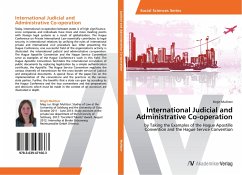Today, international co-operation between states is of high significance, since companies and individuals have more and more meeting points with foreign legal systems as a result of globalization. The Hague Conference on Private International Law essentially contributes to legal security in international relations by unifying the rules of international private and international civil procedure law. After presenting the Hague Conference, one successful field of the organization's activity is illustrated: the international judicial and administrative co-operation. The Hague Apostille Convention and the Hague Service Convention serve as examples of the Hague Conference's work in this field. The Hague Apostille Convention facilitates the international circulation of public documents by replacing legalization by a simple authentication certificate, the Apostille. The Hague Service Convention regulates the various channels of transmission for the cross-border service of judicial and extrajudicial documents. A special focus of the paper lies on the implementation of the conventions and the practices in the various state parties. Further, the benefits that a state can gain by acceding to the Hague Conference and the two conventions and the preparations and decisions which must be made in the context of an accession are illustrated in depth.
Bitte wählen Sie Ihr Anliegen aus.
Rechnungen
Retourenschein anfordern
Bestellstatus
Storno








